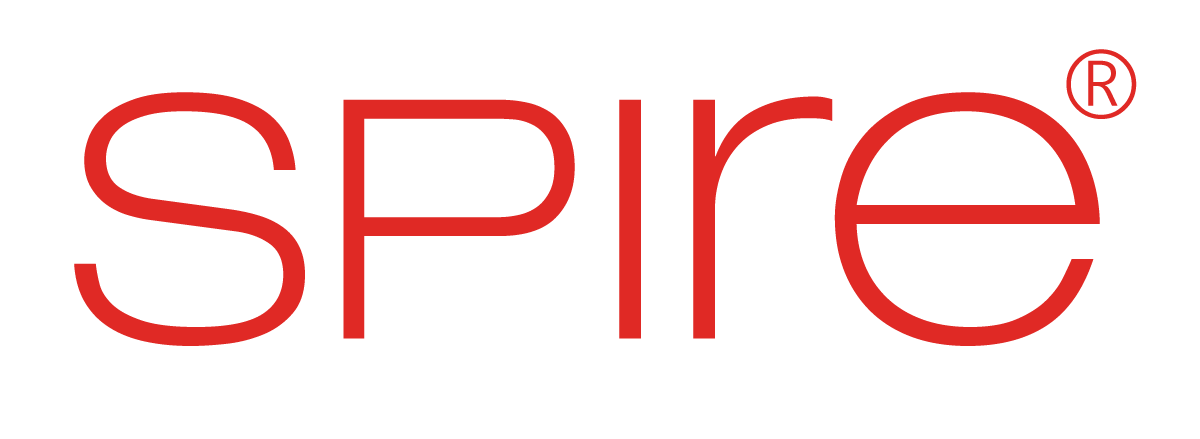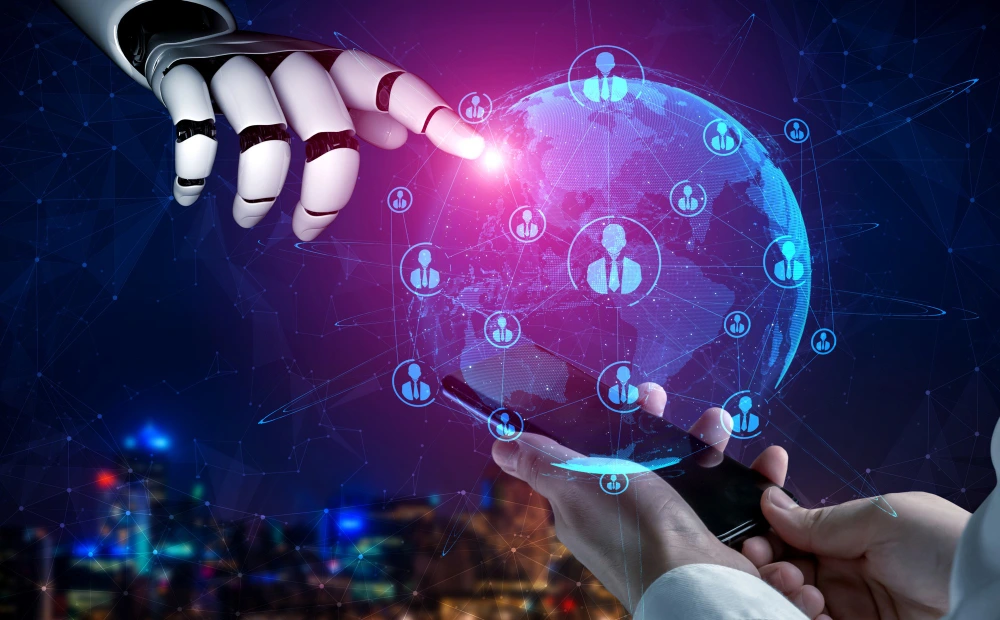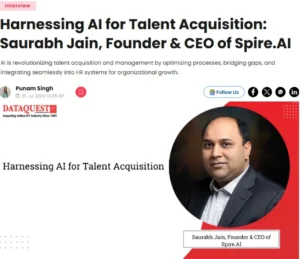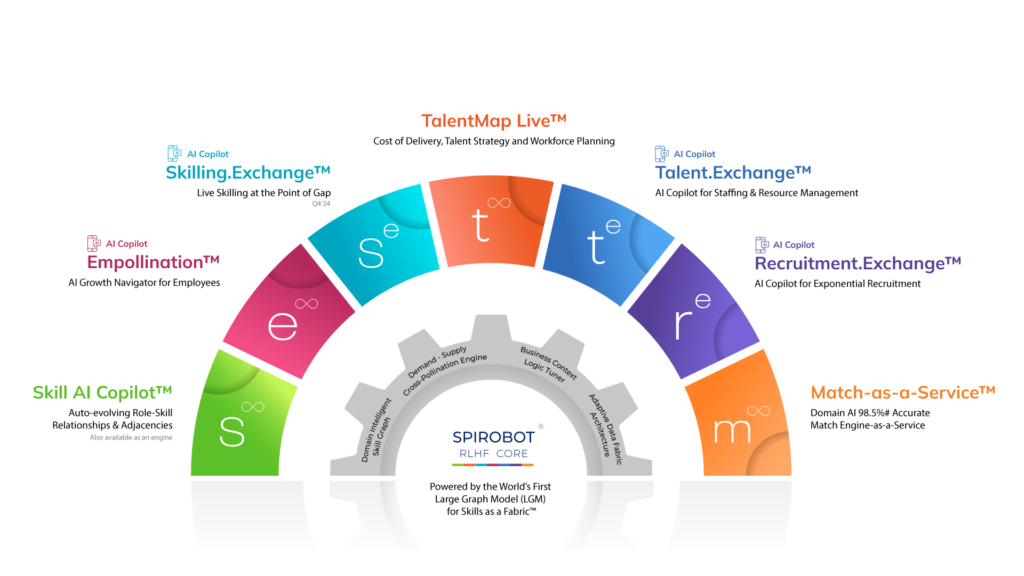Read insights by our CEO, Mr. Saurabh Jain, about how organizations can leverage Domain-Intelligent AI to create a sustainable and high-impact talent acquisition operating model in this exclusive interview with Dataquest –
Link to article: Harnessing AI for Talent Acquisition: Saurabh Jain, Founder & CEO of Spire.AI
The human resources (HR) landscape is undergoing a significant transformation. Talent leaders increasingly recognize traditional HR systems’ limitations and turn to artificial intelligence (AI) for innovative solutions. However, integrating AI into existing HR structures can be a complex endeavor. This blog post explores the best practices for a smooth and effective integration process, leveraging insights from Spire.AI, a leading provider of AI-powered HR solutions.
Understanding AI in Human Resource Management
AI in HR management refers to applying artificial intelligence technologies to automate and optimize various HR functions. These functions encompass talent acquisition, recruitment screening, performance management, and employee training. By leveraging AI’s analytical capabilities, HR teams can gain valuable insights into workforce data, leading to more informed decision-making and improved talent management strategies.
Challenges of Integrating AI into HR Systems
While AI offers immense potential for HR transformation, integrating it into existing systems can be challenging.
“Talent leaders now recognize the need to adopt AI solutions to overcome the limitations of existing HR systems. However, many initiatives fail because they overlook the critical aspect of an integrated operating model between current HR systems and the new AI tools.”
– Mr. Saurabh Jain, CEO, Spire.AI
Disparate data formats, compatibility issues, and a lack of user adoption can all hinder a successful integration. Additionally, ensuring data security and navigating cultural resistance within the organization can pose significant hurdles. Let’s delve deeper into these challenges:
- Data Disparity and Integration Issues: Existing HR systems often use different data formats and structures. This disparity can make integrating the data seamlessly with an AI system difficult. Spire.AI addresses this challenge through meticulous data mapping and cleansing, ensuring smooth data flow and maximizing the effectiveness of the AI algorithms.
- Compatibility Challenges: Integrating a new AI system with existing HR software can be complex due to compatibility issues. Different software vendors may have unique APIs or data structures, requiring additional effort to ensure seamless communication and data exchange. Spire.AI’s team of experts navigates these complexities, leveraging advanced APIs to achieve a smooth and efficient integration.
- User Resistance and Lack of Adoption: Introducing a new AI system can lead to apprehension among HR personnel accustomed to traditional workflows. Overcoming this resistance requires a well-defined change management strategy. Spire.AI tackles this challenge by providing comprehensive training programs that equip HR teams with the skills and knowledge to leverage AI tools effectively. Additionally, dedicated account management teams offer ongoing support to address user concerns and foster adoption.
- Data Security Concerns: Integrating AI into HR systems raises data security and privacy concerns. Sensitive employee data needs to be protected from unauthorized access or breaches. Spire.AI prioritizes data security by implementing robust security protocols throughout the integration process. This includes data encryption, access controls, and regular security audits.
- Cultural Resistance to Change: Implementing AI can lead to organizational cultural shifts. Traditional work practices need to be adjusted to accommodate the new AI-driven system. Effective communication and stakeholder engagement are crucial to overcome resistance and ensure everyone is on board with the transition. Spire.AI supports developing communication plans and engaging stakeholders to create a culture of acceptance and adoption.
By understanding and addressing these challenges, organizations can minimize risk and ensure a smooth and successful integration of AI into their HR systems. Spire.AI’s comprehensive approach, from initial assessment to ongoing optimization, empowers HR teams to leverage AI’s full potential and significantly improve their talent management strategies.
Spire.AI’s Best Practices for Seamless AI Integration
Spire.AI addresses these challenges through a comprehensive and phased implementation approach that minimizes risk and maximizes the benefits of AI for HR operations. Let’s delve into the critical steps involved:
- Assessment of Existing HR Systems: The integration process begins with thoroughly evaluating the client’s existing HR systems. This involves identifying current workflows, data integration points, and potential challenges.
Saurabh Jain emphasizes, “The process begins with thoroughly assessing the client’s existing HR systems to identify current processes, integration points, and challenges. This exercise forms the basis for functional and data integration plans.”
This initial assessment lays the groundwork for creating a seamless, high-impact, integrated operating model.
- Data Mapping and Cleansing: Data is the lifeblood of any AI solution. Spire.AI ensures data accuracy through meticulous data mapping and cleansing. This involves standardizing data formats, identifying and rectifying inconsistencies, and ensuring data security. Advanced APIs seamlessly integrate existing HR systems, minimizing disruption to ongoing HR operations.
- Benchmarking: A unique aspect of Spire.AI’s approach is its benchmarking process. By analyzing the client’s data, Spire.AI provides talent leaders with a projected value and impact of the AI integration even before implementation. This sets a clear benchmark for anticipated improvements in talent hiring, employee mobility, reskilling, and overall talent growth.
- HR Training: Spire.AI equips HR teams with the necessary skills and knowledge to leverage the new AI-powered system effectively. Comprehensive training sessions ensure user familiarity and build confidence in AI tools. Additionally, dedicated account management teams provide ongoing support to address issues arising after implementation.
- Phased Implementation: Spire.AI advocates a phased implementation approach to minimize complexity and mitigate risk. This involves breaking down the integration process into manageable stages, with each stage thoroughly tested and optimized before moving on to the next. This iterative approach allows adjustments, ensuring a smooth and successful transition.
- Change Management Support: Integrating AI into an organization’s HR structure can lead to cultural and operational shifts. Spire.AI recognizes the importance of change management and provides comprehensive support to navigate these transitions. This includes developing communication plans, engaging stakeholders, and implementing user adoption programs to ensure everyone is aligned with the new AI-driven system.
- Continuous Monitoring & User Feedback: The integration process doesn’t end with implementation. Spire.AI continuously monitors the AI system’s performance and gathers user feedback. This allows for ongoing optimization and adjustments to ensure the system remains aligned with the organization’s evolving needs. Regular updates and operating model audits further enhance the system’s effectiveness.
Conclusion
By following these best practices, Spire.AI ensures a smooth and effective integration of AI into existing HR systems. This minimizes risk and unlocks AI’s full potential to transform HR operations. Personalized support, robust training programs, and continuous optimization empower HR teams to transition seamlessly to an advanced, AI-driven integrated talent operating model.
Frequently Asked Questions
How is AI used in human resources?
AI is used in HR for tasks like talent acquisition, employee onboarding, performance management, payroll, and employee engagement. It can automate routine tasks, improve decision-making, and enhance employee experiences.
How AI helps HR in decision-making?
AI provides data-driven insights and predictive analytics to support HR decision-making. It can help identify trends, predict workforce needs, and optimize HR processes.
As Saurabh Jain concludes, “Spire.AI guarantees seamless and effective AI integration, maximizing the benefits for HR operations. Personalized support, robust training, and continuous optimization ensure clients transition smoothly to an advanced, domain-intelligent AI-driven integrated talent operating model, keeping them ahead in the competitive talent landscape.”







